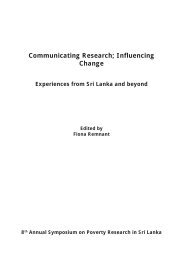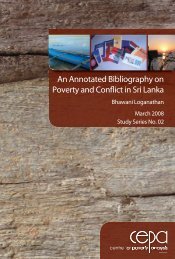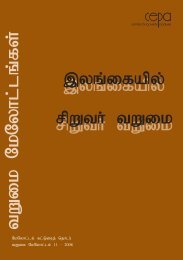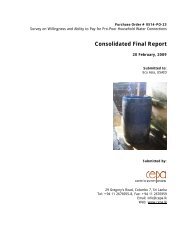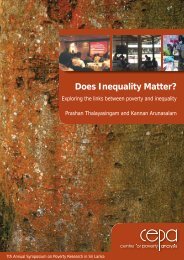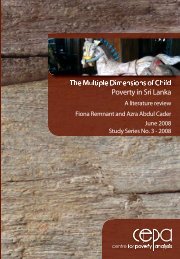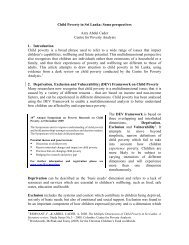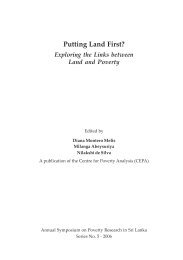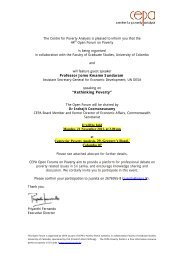Involuntary Displacement and Resettlement â Policy and ... - CEPA
Involuntary Displacement and Resettlement â Policy and ... - CEPA
Involuntary Displacement and Resettlement â Policy and ... - CEPA
- No tags were found...
You also want an ePaper? Increase the reach of your titles
YUMPU automatically turns print PDFs into web optimized ePapers that Google loves.
ecognised, upheld <strong>and</strong> considered legitimate by the state as well as othergroups in society (475). With respect to this study, officials appear to havegiven preference to families with original property deeds in a male householdmember’s name even when a woman had the same paperwork in her ownname.Access to Compensation: Legal Action Against the StateIn their struggles for recognition <strong>and</strong> compensation, many families filed legalaction against the state. The Human Rights Commission established a legal aidcommission specifically to assist affected persons to use the judicial system toaddress outst<strong>and</strong>ing claims. Unfortunately, most cases were dismissed evenbefore the petitioner was allowed to submit written testimony (Personalcommunication, 10 January 2008). The few cases that made it to the SupremeCourt were not well received.In line with the house-for-house policy, if multiple siblings <strong>and</strong> their familieswere living in three separate houses on the same piece of l<strong>and</strong> (even ifregistered in only one person’s name), all three families are entitled tocompensation. However, these claims were regularly denied. In one casebrought by families living in a Moratuwa shelter site, the Supreme Courtrefused to grant leave to proceed on the basis that some of the petitioners (theadult children) failed to prove that they lived in houses separate from theparents. The petitioners were four Sinhalese fishing families (parents <strong>and</strong> theseparate families of their three married children) living in unauthorisedconstructions along the sea shore. The government’s electoral register listedeach family as living in a separate house with its own unique identificationnumber. However, the Supreme Court stated that the electoral register is notsufficient proof that these petitioners lived in separate houses, but theresponse did not end there.The individual presiding over the case stated thatthe petitioners were trying to ‘get as much as possible from the situation they are in’,emphasising that these petitioners were living in the camp in order to get freefood <strong>and</strong> were waiting there until another tsunami hit, so they could get evenmore. Their counsel argued on their behalf, elucidating the challenges of livingin transitional sites, for example, not having electricity or garbage removal. Infact the electricity was recently disconnected <strong>and</strong> garbage collection stopped toforce people to leave the camp. To this statement the individual retorted,“Whatnonsense! Do you think that they had garbage removal at their former homes inMoratuwa? What do they want by coming to court? Do they want to go in air-conditionedcars?! Do they expect to be given houses which we will h<strong>and</strong> over with a golden key?”(Personal communication from a lawyer present at the court, October 2007).192



